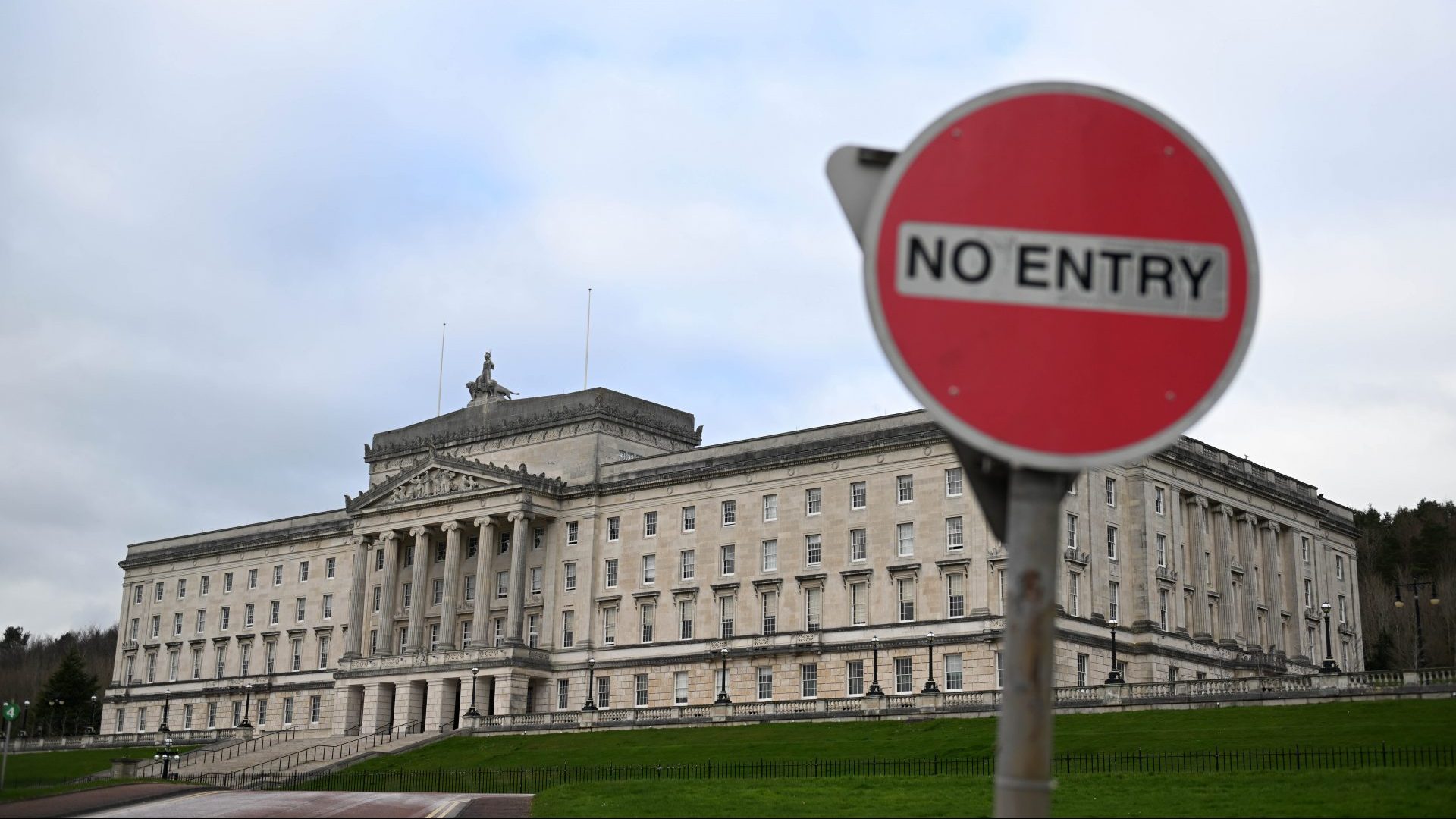Ciaran Ferrin wants his maths checked. By his calculations, in the last five years, Northern Ireland’s government has spent more time out of office than in.
“I was born in 1998, so the same year the Good Friday Agreement was signed, and I’ve been living with Stormont behaving this way for my whole life. It’s a huge proportion of time,” Ferrin, chair of the Belfast Climate Commission’s Youth Working Group and Partnership Funding Officer for the EU’s Young European Leadership group, shares with me when we speak in Belfast at this year’s One Young World summit, the platform for young leaders’ annual conference that brings together young activists from across the globe. His estimations are not wrong.
For Northern Ireland’s Gen Z, a dissolved parliament has become the reluctantly accepted norm. At Stormont, power must be shared, but some of those involved have been reluctant to do so. And so, between December 2, 1999 and December 2, 2004, the assembly’s powersharing executive failed to function for 48.7 per cent of its first five years. In comparison, from November 8, 2017 to November 8, 2022, the executive was suspended for 1,071 days while active for just 755, equating to 58.7 per cent. In other words, the last five years have been some of the least productive in the assembly’s history.
Today, Stormont is 20 months into its eighth suspension, prompted by the resignation of DUP first minister Paul Givan over the introduction of the Northern Ireland Protocol. Now, DUP leader Sir Jeffrey Donaldson is only prepared to offer hints at when the government may return. All the while, younger generations are increasingly frustrated with the political in-fighting that has become synonymous with its existence.
“I’m going to put political opinion aside and think about what can be most effective for the country and create a fully functioning system,” says Ferrin, mulling over whether this would look like one with limited powers or a “lighter advisory touch”. He adds: “With those conditions in mind, I hope we get our government back as it’s needed to pass certain laws and push through things that are on the back burner.”
In this sense, Ferrin admits, proceedings feel similar to the pandemic when the UK was in lockdown where bills and policy decisions went into political purgatory. Except this time, it’s a delay of the executive’s own doing. “Our system,” he sighs, “is broken”.
Ferrin was not alone in his frustration. The day after we spoke, Chloe Marks, a 19-year-old university student, took to the summit’s stage. Marks told the audience how she grew up within a nationalist Catholic community and yet as she entered her teens, all she could see around her was hostility and division.
“When I moved to Belfast for university, people sought to know where I came from so they could label me as a threat or an ally,” she said, explaining that her generation is now in need of a government capable of working together to resolve leftover tensions. “The Good Friday agreement was a moment in history,” she concluded, “but if we want a lasting peace for the next 25 years and for the next generation, we must actively involve our young people.”

When Marks sat down, four other young speakers took to the podium in turn, all arguing that, at the very least, young people in Northern Ireland deserved a functioning government.
When I put these grievances to Lord John Alderdice, former leader of the Alliance Party and speaker of the Northern Ireland Assembly, he’s sympathetic. “I understand his… complaint, if you like,” he says, hesitating over his choice of words. He wouldn’t advise anyone putting money on the DUP reaching an agreement by the end of the month but hopes “Jeffrey will summon up the courage” to do so. In the unlikely scenario that the DUP leader does, however, a new set of problems will arise as the party has spent months “talking about why they can’t do it and why it’s terrible”. Alderdice explains: “I rather fancy that what will happen is that, in order to move on, we’ll move to what you might call de facto joint authority.”
In the more likely event that the boycott continues into its 21st month, like many, Lord Alderdice then believes that Stormont will not realistically sit again until after Westminster’s next electoral cycle. This then puts the country in the timeframe of an election in Ireland where “strengthening Sinn Féin, both in the north and in the south”, isn’t out of the realm of possibility.
Back in London, meanwhile, polling indicates that the next election could see a Labour government in No. 10 – a party. Lord Alderdice says, who have been “historically less sympathetic to Unionists”. To Lord Alderdice, the situation almost verges on amusing. “Unionists are behaving in a quite self-damaging way by refusing to work. But you know, it’s funny. People often do things that make their situation worse.”
“It’s important to understand that when we signed the Good Friday Agreement, the expectation was that we would be able to continue to work this for a generation or two. We’d see how things would go and it would be for future generations to decide what they would want to do. But at the time, getting the agreement was paramount, it stopped the killing” he says. The problem, he adds, has been that the Unionists “regressed to this kind of disrespectful, uncooperative behaviour” while Brexit “completely upended all the assumptions that we had had about British-Irish relations.”
In April, former US president Bill Clinton remarked that it was a “miracle” that the Good Friday Agreement had survived Brexit and while Lord Alderdice is reluctant to go this far, he sees it as the biggest challenge the agreement has faced in its 25 years. The release of paramilitary prisoners also presented an obstacle as well as dealing with the issue of The Troubles’ legacy but Brexit presented a new type of issue. “It was a different order of business as it created a problem between the two governments. This was absolutely critical long before the Good Friday Agreement, back to the Anglo-Irish agreement in 1985,” he says.
To make matters worse, lawmakers were warned of the issues that the UK’s departure from the trading bloc would present, only they looked the other way. “Brexiteers are never going to stand up and say: ‘this was a huge mistake’. Those in the DUP, who were the main Brexiteers here, as you can see, still have not really accommodated themselves to the fact that they lost. They haven’t really internalised or understood it,” he says.
Monica McWilliams, co-founder of the Northern Ireland Women’s Coalition, believes this misconception extends to Westminster. “For me, being part of Europe was being at the negotiating table and ensuring that we were bigger than this little island. Multilateralism really helped us and being part of Europe was partly a way to resolve our conflict. We pushed for the European Human Rights Convention to be in law and it came in two years later – only 25 years later to hear the government wishes to revert it.”
McWilliams is also the former Chief Commissioner of the Northern Ireland Human Rights Commission, tasked with ensuring a Bill of Rights remains on the political agenda. “I produced that advice and it has never been legislated for and that was Westminster’s responsibility,” she says, adding that Westminster had no time for the convention of rights in the first place. “But that’s the Conservative government for you.”
Going forward, she says, this means there’s “everything to play for in terms of Keir Starmer’s leadership and Labour returning to power”.
When the Good Friday Agreement was signed, McWilliams was one of the few women around the table. “One person told me the only table I should be at was the one I was polishing. That was how we were treated and they got away with those insults,” she says. During the negotiations, the sexism McWilliams and her colleagues experienced was rife. Calling her a “stupid woman”, one male politician yelled at her to shut up and sit down (two decades later, the abuse inspired the name of her memoir Stand Up, Speak Out).
They also had an “insult of the week” notice board and on more than one occasion posters of McWilliams were defaced with genitalia and witnessed by her children. “What kind of a man does that,” she says, “unless they truly want you to disappear”. While the collective of women around her was a foolproof coping mechanism, humour was also key. “Every time they used to tell us to stand by the good men of Ulster, we used to sing Stand By Your Man and laughed back at them.
“I have to say 25 years later that’s an unfinished business,” she adds. When I ask her to elaborate, she draws on an example from a few hours ago when McWilliams was speaking on a panel with Hasina Safi, Afghanistan’s former minister for women’s affairs who’s now in exile. Immediately before this, Lord Alderice, former PUP leader Dawn Purvis and former Sinn Féin leader Gerry Adams were speaking on stage and when they left, a vast proportion of the audience exited too. “Half the audience walked out after Gerry Adams finished talking. That’s what happens all the time, the rockstar of Northern Ireland politics. Now, the audience came back in to hear President Santos speak afterwards, but what does that tell you?” she says.
“At the moment we’re a very unsettled people,” adds McWilliams, who feels the conflict is still being played out today, only Gen Z are witnessing it “by very different means”. Lord Alderdice expresses a similar sentiment. “It feels to me that relations have slipped back. Can it be repaired? Can it be rescued? Maybe,” he concludes.
In the meantime, the DUP are insistent they won’t be forced back into office. “If they’re going to act like this, are politicians even necessary?” Ferrin asks rhetorically. The question, he adds, has been on his generation’s lips over the past few months as they tire of the situation.
Knowing this is unrealistic, Ferrin offers a new way forward. “Yes, we need them back in government but we need to talk about the way in which we govern in the first place,” he says. If Gen Z have their way, the next 25 years could look starkly different for Northern Ireland.












